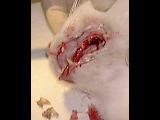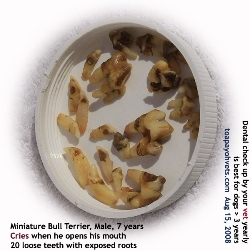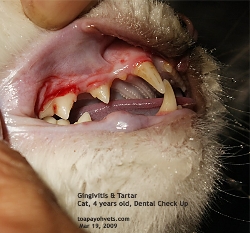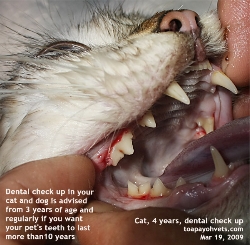 TOA
PAYOH VETS TOA
PAYOH VETS
toapayohvets.com
Date:
14 November, 2009 |
|
Focus: Small
animals - dogs, cats, guinea pigs, hamsters & rabbits |
|
|
|
|
|
|
SURGERY HOURS:
|
*10 a.m - 5 p.m (Mon - Sun,
except Sat). Dr Sing Kong Yuen. By Appointment Only.
*6 p.m - 10 p.m (Mon - Fri). 10am - 5pm (Sat). House-calls available. Appointment preferred.
Tel: 6254-3326, 9668-6469 |
EMERGENCY
11 p.m to 6 a.m
9668-6469, 6254-3326 |
judy@toapayohvets.com
Fax: +65 6256 0501 |
|
|
|
Toa
Payoh Vets Clinical Research
Making veterinary surgery alive
to a veterinary student studying in Australia
using real case studies and pictures |
|
VETERINARY SURGERY
Teeth Problems in the Singapore Dogs & Cats
Case updated:
14 November, 2009
Dr Sing Kong Yuen, BVMS (Glasgow), MRCVS |
|
|
Case
Report in 2009. Dental Problems in the older cat in
Singapore |
|
|
|
Many
Singapore Cat Owners are not aware that their older cats
have severe periodontal diseases as the cat is quite an
independent creature, grooming himself or herself. At
around 3 years of age, gingivitis (gum infection)
develops. A dental scaling and yearly check up will have
prevented loss of teeth at around 5-10 years of age.
|
0520602Singapore old cat tooth decay, gingivitis,
periodontitis, pet health and welfare educational for
animal lovers, excerpts from
Be Kind To Pets, sponsored by AsiaHomes
Internet. Written in Jun 30, 2002.
Case Report in 2002. The cat with the loose
tongue |
"This stray cat's tongue has been hanging out
the front of mouth for the past few weeks.
What's wrong with him, doc?" asked Ms Chow who
was concerned as she fed it regularly downstairs
after her office work at the government ministry
in charge of problem teenagers who "stray"
after schools, the latch-key kids of Singapore.
These kids have no purpose in life and mix with
bad company, Ms Chow had told me. Staring at
each other could provoke a fight between the
teen gangs.
It is an unusual habit for any normal cat.
Cats like to keep very clean and don't hang out
tongues. Was its tongue paralysed after
another cat battle in the hawker centre to
establish its territory? This was a
six-year-old male cat and would have been wise
to the battles for ground and female cats.

A
half-inch pink tip would be seen hanging from
his lips. He had no appetite and objected
strongly when I inserted the thermometer into
his rectum to check whether he had a fever. He
just swiped his claws into my right hand in less
than a blink of the eye. I got a
10-cm scratch for not being lightning fast
enough.
"It may be having mouth ulcers or a severe tooth
ache on one side" I said. The tip of
the tongue hung more to the right side, as if
there was acute pain on the left side. The
cat's mouth dripped saliva in thick serous
streaks and there was a strong rotting smell of
bad breadth.
"You don't expect the cat to answer your
question, doc?" asked Ms Chow.
The cat clawed me again when I tried to open his
mouth with my thumb and forefinger of the right
hand. No nonsense from any veterinarian,
his brown eyes with pupils dilated widely,
looked straight at me.
"Don't grip his front feet tightly as cats don't
like it and get angrier!" I advised Ms Chow who
was firmly restraining the cat. I didn't
want Ms Chow to get her face scratched as that
might affect her marriage prospects. Beauty may
be skin deep but a scratched face for a young
woman will disadvantage her in her marriage
prospects.
|
"I have no choice but to tranquilise him with
one injection into his back muscle." I told Ms
Chow. The cat did not attack her as she
distracted him with a few words.
The cat felt drowsy in 10 minutes. I put
him on a gas general anaesthesia to check for
more decayed teeth. Two loose and decayed
upper left molar teeth were extracted easily
within 2 seconds.
The redness around the molars indicated that the
gums were infected with germs which undermine
the integrity of the tissue and causing
gingivitis (infected gums).
Normal molar teeth of six-year-old cats have
three deep roots which anchor them into the gum
tissues firmly and cannot be extracted so
easily. The roots were decayed as you
could see them on the lower left of the picture.
The lower molars of the left gums were enveloped
with a thick crust of tartar but were still
strongly anchored into the lower jaw. The
tartar was removed and all the teeth were given
an ultrasonic dental scaling.
There were no mouth ulcers or gum tumours. The
tongue no long hung out. I don't expect to
see this stray cat again as he will not get any
annual veterinary check up or booster
vaccination, being a street cat with the freedom
to roam the void decks of the Housing and
Development Board precincts and the street
smartness to avoid being trapped by the
government cat catchers.
Note:
Teeth problems in the domestic cat are due to
genetics and the diet, amongst other factors.
In the wild, cats e.g tigers or leopards feed on
real meat which cleans their teeth as they chew.
Some domestic cats fed soft food can suffer from
severe gum and teeth problems caused by various
factors including inherited weaknesses.
Cats, usually over 6 years old, suffer from 2
major degenerative oral problems: periodontal
diseases (gum diseases) and resorption
cavities.
In gum diseases, the necrotic mouth
ulcers and bad breadth are due to bacterial
infection of the mouth. If the bacteria reaches
the back of the throat, the cat may lose its
meowing voice and has a bad breadth. Antibiotics
and teeth scaling may stop the bad smell of
purulent stomatitis (mouth inflammation) but
there is a need to extract the decayed back
teeth. Cats need to have their diet
modified if they don't have back teeth but they
manage well.
In cervical resorption, there are
cavities (holes) on the surfaces of the back
teeth, close to the gum margins. They are not
decay cavities but are caused by an auto-immune
response. The cat's body's defences
destroy the teeth. The cat may lose appetite as
it is very painful. Teeth extraction is the best
treatment.
Reference:
A Colour Atlas of Veterinary Dentistry and Oral
Surgery" by Peter Kertesz. Peter is a
dental surgeon for people and is a dental
consultant for animal organisations and
international zoos including London and
Whipsnade zoos for the past 20 years. He
lectures all over the world on veterinary
dentistry. When it comes to treating animals,
Peter has strong ethics. He never performs
surgery to please the owner and only treats pets
that have been referred to him by a vet. |
|
|
|
|
 Periodontal Disease Periodontal Disease
Be Kind To Pets
You don't need to live with bad breath in
your dog or cat
Get a yearly dental
check up for your best friend
and don't let him or her
suffer oral pain
daily
|
|
 Toa
Payoh Vets Clinical Research Toa
Payoh Vets Clinical Research
Making veterinary surgery alive to a veterinary student studying
in Australia using real case studies and pictures |
|
|
Copyright ©
Asiahomes Internet
All rights reserved. Revised: November 14, 2009
Toa
Payoh Vets
|
 TOA
PAYOH VETS
TOA
PAYOH VETS



